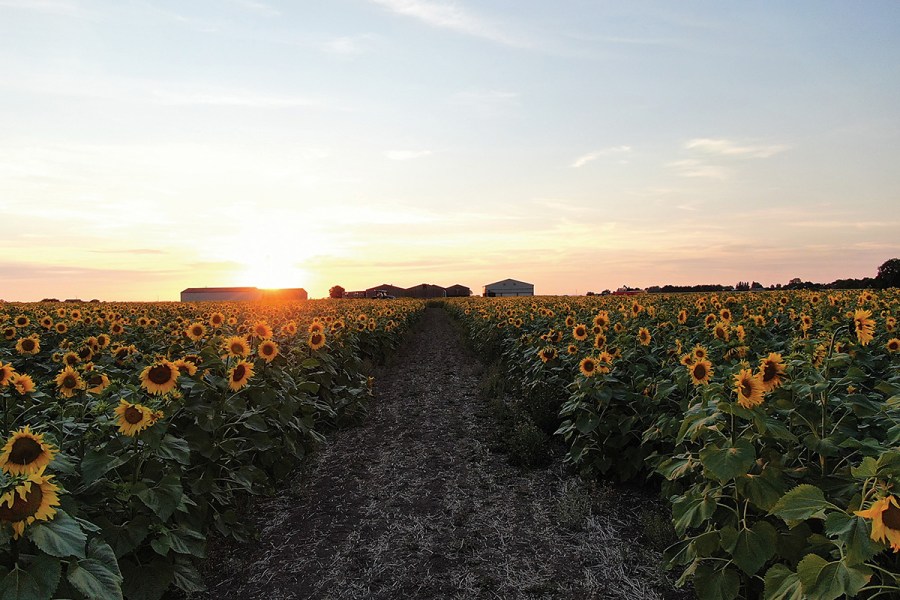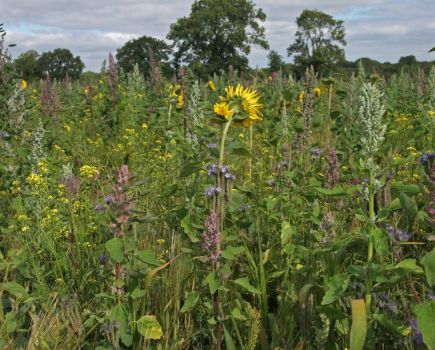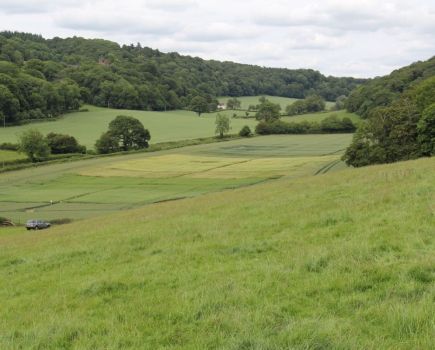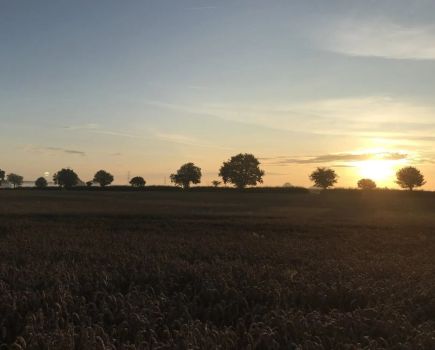From growing niche bird seed crops to organising public engagement activities, the work of two Cambridgeshire brothers has seen them crowned the winners of a coveted sustainability award. CPM catches them mid-harvest to learn more about their business’ vision.
“It’s easy to be quite insular and struggle to see the good of what you’re doing when you’re in the middle of it all.”
By Janine Adamson
It’s the middle of August and therefore in the thick of harvest, yet Matthew and Lloyd Smith have sacrificed precious time to welcome CPM to their farm in Huntingdon. It’s all in the name of discussing sustainable agriculture, in particular, their recent award win.
They’re the third generation at the farm, which currently stands at 182ha, and the conversation begins by describing what life was life 18 years ago, back when their father retired and they took over the business.
“We were a conventional Fenland farm with a rotation of wheat, potatoes and beet. Blackgrass pressure was low because we used the plough; things were fairly simple then,” explains Matthew. “Change within the industry just didn’t seem high on the agenda, chemistry was king and we were only just starting to see the break-down of active ingredients.”
This, coupled with the fact the brothers were young – Matthew had recently graduated from university and Lloyd was still at college – meant it was business as usual for the first seven or so years. But then blackgrass pressure increased. “Change started by moving away from second wheats and introducing spring barley, all to help with managing blackgrass,” says Lloyd.
At the same time, the reality of a future without BPS was looming, something which Matthew says they were quick to act upon.
“We had to make efficiencies across the whole business starting with machinery. We didn’t bury our heads in the sand, we tried to prepare ourselves early doors,” he says. “This naturally led to us using the Hybrid Claydon drill which reduced how much we were moving the soil and kept the blackgrass seedbank at the top of the profile.”
Due to their soil type, the brothers say they weren’t confident to make the leap to no-till straight away and that the Claydon has proved an ideal step between. Before they knew it, they introduced inter-row hoeing and were able to reduce their overall chemistry use while reaping wider benefits such as improved soil health.
“Being honest, profitability remains our driver but we believe that it can co-exist with a sustainable approach,” comments Lloyd. “It’s not about ticking a box, it’s about making decisions for the right reasons.”
With the years having flown by, Matthew and Lloyd now find themselves operating a 12-crop rotation including wheat, barley, potatoes, sugar beet, beans, sunflowers, linseed, canary seed and millet. It’s this diversity which Lloyd says should help to protect the business while external factors remain unstable.
Some might ask, why grow canary seed? The simple answer is, for bird food. The farm now has a business-to-consumer enterprise – Spadger Bird Seed, as well as growing such crops on a commercial contract basis. The idea was sparked after seeing an increase in farmland birds.
“The irony is, keeping the birds off the growing crop,” jokes Matthew. “Pigeons, especially, love the sunflowers but once they’ve eaten the growing point, it can’t come back.”
They explain that most of the seed is grown for commercial contracts for added security, but they now have a regular spot at a local market and hope to participate in pop-up shops. From a practical perspective, grown well, crops such as sunflowers require lower inputs and compared with conventional cropping, harvest is staggered to ease workloads.
And in terms of biodiversity, growing bird seed has many benefits which the brothers champion. “Small areas of crop with later harvests provide plenty of cover for wildlife such as hares and deer, and pockets of habitat for insects,” says Matthew.
“However, it can be difficult to apply for stewardship schemes in this region. We have great wildlife corridors in the drains and ditches but there’s little to reward those from SFI options.
“Due to how the Fen was established, there are no corners or areas to square off for stewardship and we’re discouraged from planting trees on organic-type soils. Our options for securing additional funding are limited.”
Instead, growing bird seed crops has opened up engagement with residents in their local village, Ramsey Mereside, with the farm hosting a sunflower walk last year. Not only did around 600 people visit, but £1000 was raised for the Air Ambulance Trust.
“We were a little concerned when single figures turned up on the first evening, but before we knew it people were travelling considerable distances to take part,” says Lloyd. “Building a rapport with the public creates loyalty and means they’re more understanding when we’re holding up traffic with the harvester, for example.”
Because for the Smiths, it’s all about ensuring a viable farming business, which they say is based around communication and collaboration. Agronomist George Baxter is among their trusted crew, who Matthew and Lloyd say has been integral in moving the farm forward by providing support across their whole enterprise.
That said, when speaking to CPM, George quickly batted the kudos back to the brothers. “They’re not afraid to try something new and are highly engaged in progressing their business. Importantly, they’re doing it for the right reasons, not just because it’s a fashionable thing to do,” says George.
According to the agronomist, who works for Hutchinsons, the farm’s niche crops are doing well, although aren’t without challenges. He says they require a greater attention to detail because they’re not always as resilient as their broadacre counterparts.
“Approved chemistry is very limited for these crops and much is only available through EAMUs, so it’s important to be mindful. It’s all about the foundations – seedbed conditions, soil temperature and moisture, and the drill set-up. Preparation and good management are key,” he says.
This is where Matthew and Lloyd’s team approach pays off. “We’re all on the same page and I’m simply there to help facilitate their journey,” comments George. “Their enthusiasm makes change and evolution very natural and my role as an agronomist much easier.
“They question and push me from my comfort zone, but that means I hold them in high esteem because they place a lot of trust in me to make the right decisions for their business.”
So what’s next for the brothers? That all depends on crop performance, says Lloyd, for example, peas are no longer part of the cropping rotation due to their susceptibility to drought. They’re also figuring out the best use of the plough, having acknowledged it still has a role to play particularly in weed control.
However, they’re confident in their ability to cater for markets which larger growers can’t, helping to keep supply chains shorter. “We undertake a lot of operations ourselves, and with smaller field sizes, it means we can afford to take on smaller contracts such as growing 2.5ha of beans for one customer. The challenge is, of course, workflow and storage,” says Matthew.
And with such a diverse cropping rotation, it means they could still be driving the combine into the new year – a piece of kit which poses its own conundrum. “Justifying replacement machinery is a potential challenge as our hectarage shrinks,” admits Matthew.
Whatever the future holds, the Smiths remain positive. “You often hear: ‘It’ll never work in the Fens’, but you have to move away from that attitude. Don’t be afraid, learn to cope with failure and don’t give up,” says Lloyd.
It was this pragmatic approach to sustainable agriculture, combined with a strong desire to ensure their land is left better than when they found it, which attracted the attention of judges for the Rawcliffe Bridge Award for Sustainability.
The award, hosted by BASF and sponsored by Farm491 and the Institute of Agricultural Management, is in its second year and aims to celebrate individuals and businesses that deliver on the three pillars of sustainability – people, profit and planet.
Matthew and Lloyd were named 2023 winners, with the baton being passed from outgoing award holder, North Lincolnshire farmer, Colin Chappell.
Lloyd says he’s pleased that the farm has been recognised. “It’s easy to be quite insular and you can struggle to see the good of what you’re doing when you’re in the middle of it all. I’m proud that we, as a small family farm, have been able to win the award,” he says.
Matthew agrees that although they have active involvement with their local NFU and other initiatives, promoting what their business is doing specifically, is important. He says he’s looking forward to reflecting back in 12-months to see how things have moved on even further.
George says given how forward-thinking the brothers are, it’s no surprise that they’ve been presented with the award. “It’s quite refreshing to work with them both, they’re genuine people who want to improve their farm to ensure it has a viable future.
“Implementing change can be daunting, especially when it’s embarking on a niche sector or something new. Matthew and Lloyd have the right mindset in that they don’t discount something just because it hasn’t worked first time. Instead, they evaluate each step that they make to find ways to improve,” he concludes.
The runner up prize was presented to Will Oliver from Swepstone Fields Farm in Leicestershire. Will’s enterprise takes a zero tolerance to grassweeds, uses renewables to reduce operating costs, and integrates sheep within the rotation.
Reflecting on selecting the winners, BASF’s Mike Green says the company created the award to shine a spotlight on people doing novel and interesting things that could benefit the agricultural industry. “That’s exactly what Matthew and Lloyd have been doing; they’re passionate about leaving the farm in a better place than they were given it and they’re willing to try new techniques and innovations.
“We wanted to provide a platform for them to share their experiences and we know the industry will be better for it,” says Mike.
2022 winner Colin also helped to judge the awards. He says the key word the key word to describe Matthew and Lloyd is inclusive. “They include their local community, they take the environment with them in the way they structure their cropping, the family is included in the business model, and profit comes from including the bird seed within the business. Inclusivity is not always a word associated with agriculture today, but they personify it in bucketfuls,” Colin concludes.
This article was taken from the latest issue of CPM.
For more articles like this, subscribe here.
Sign up for Crop Production Magazine’s FREE e-newsletter here.




